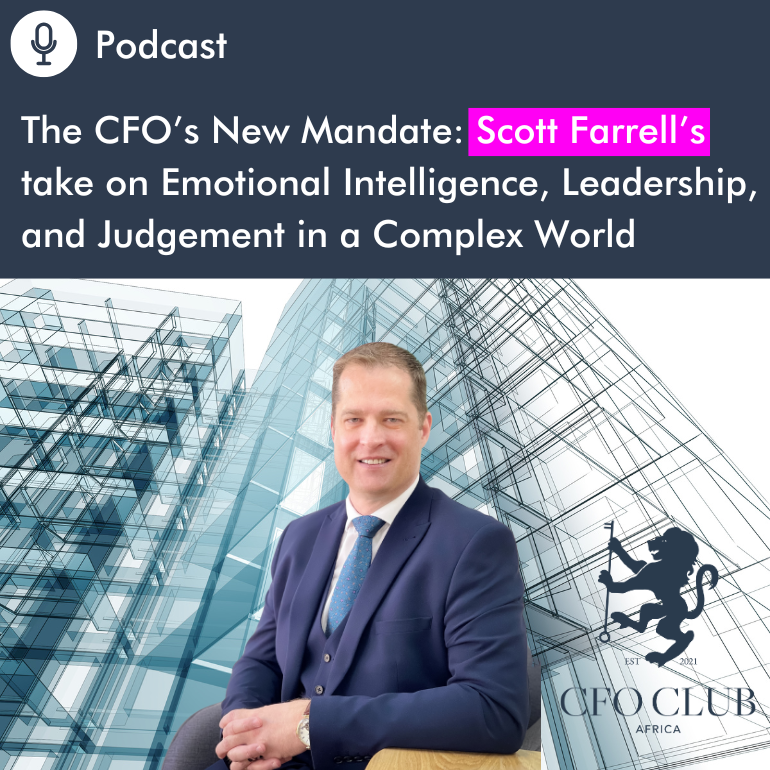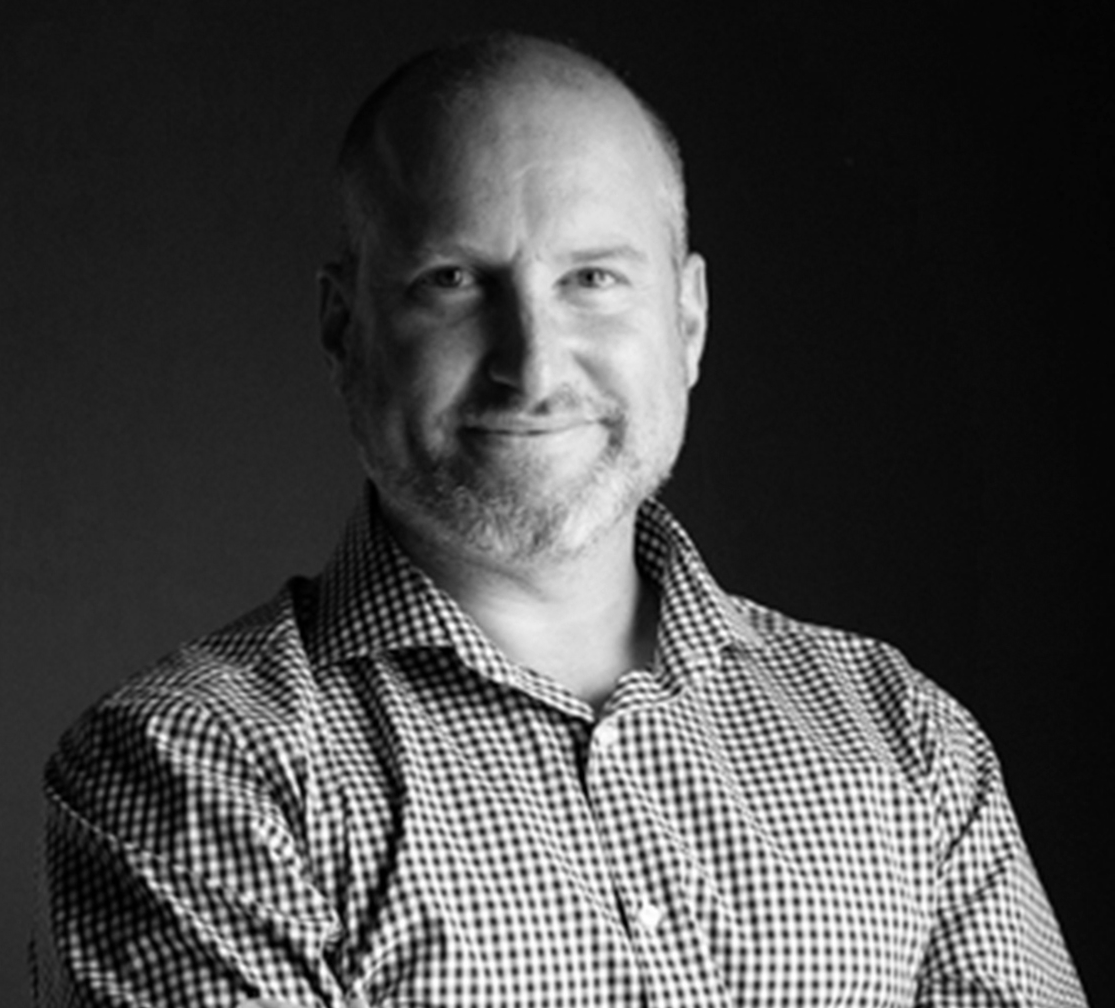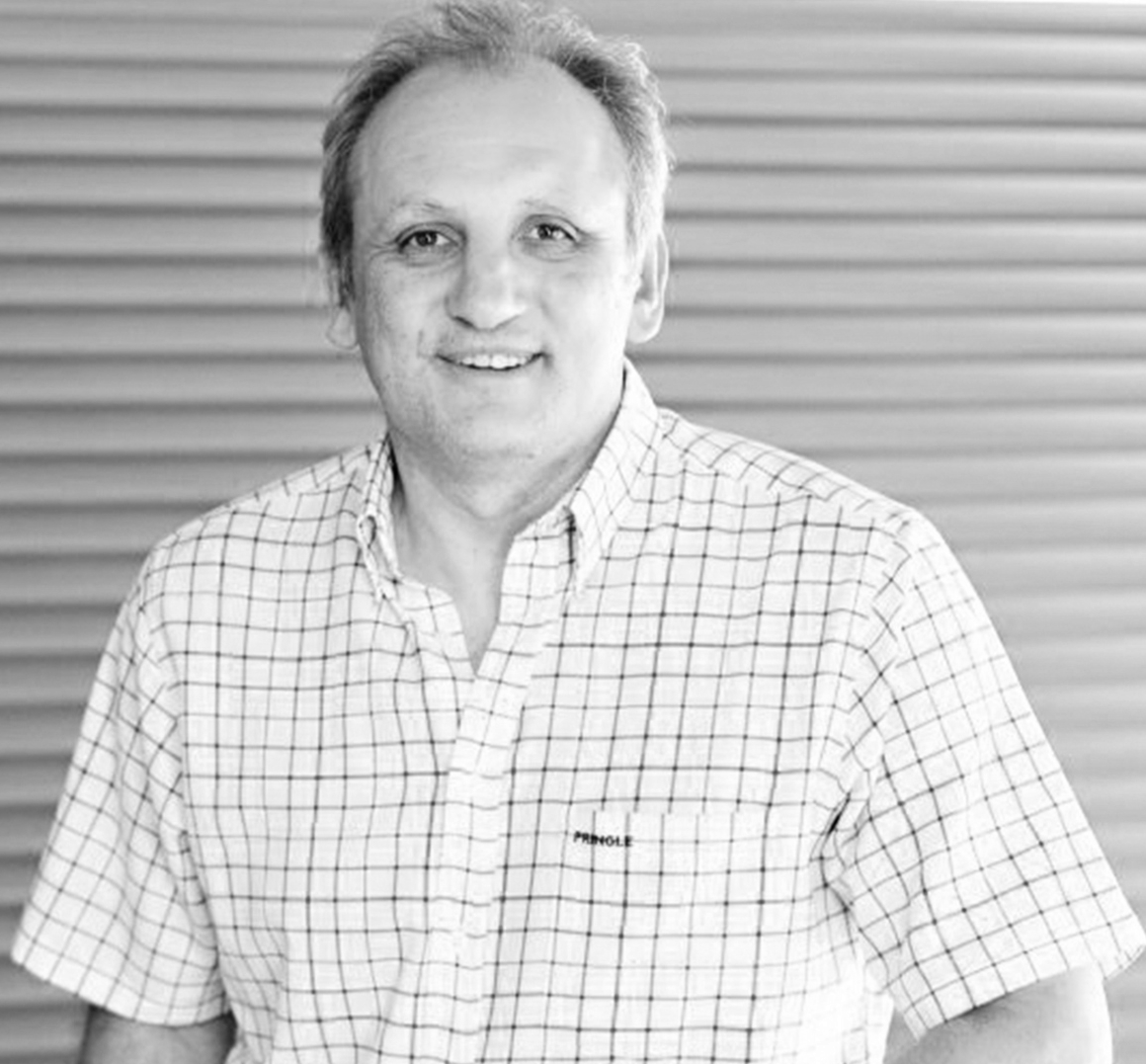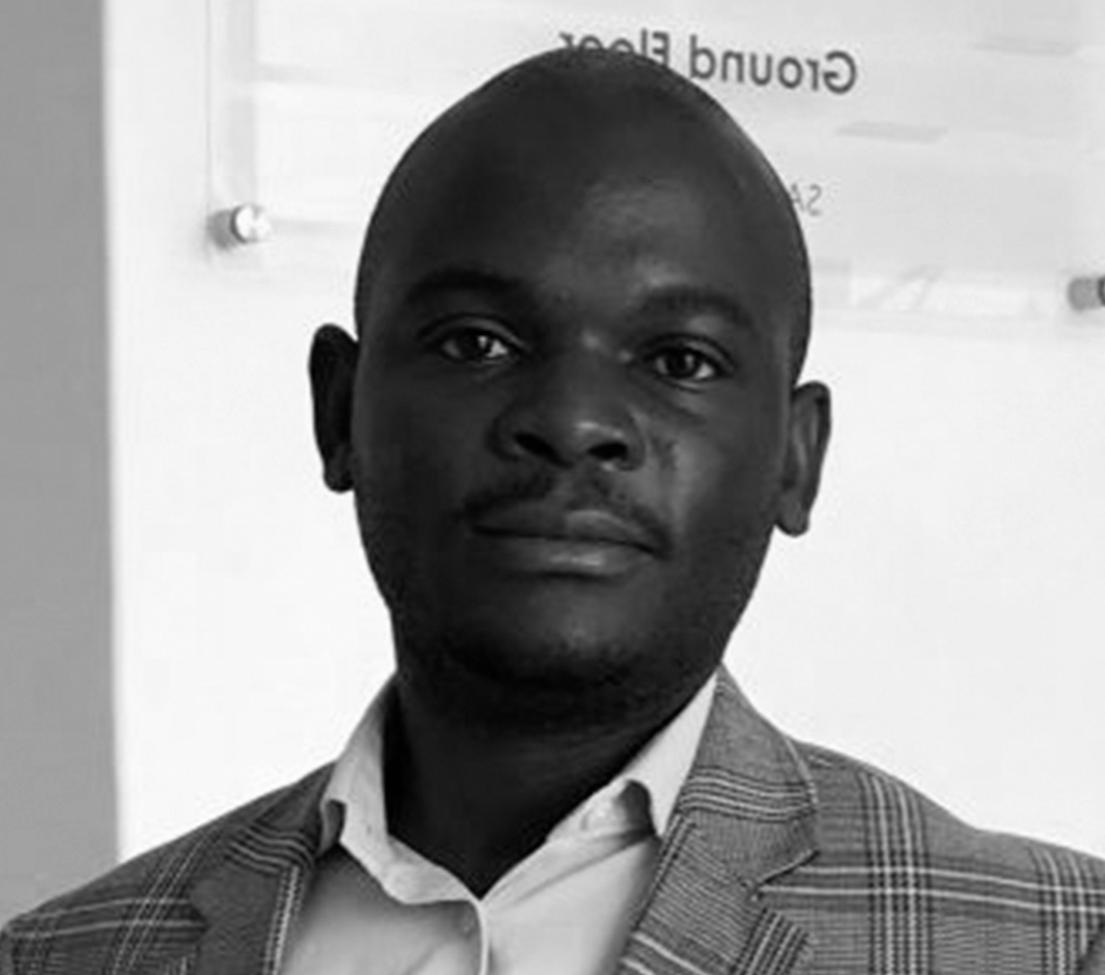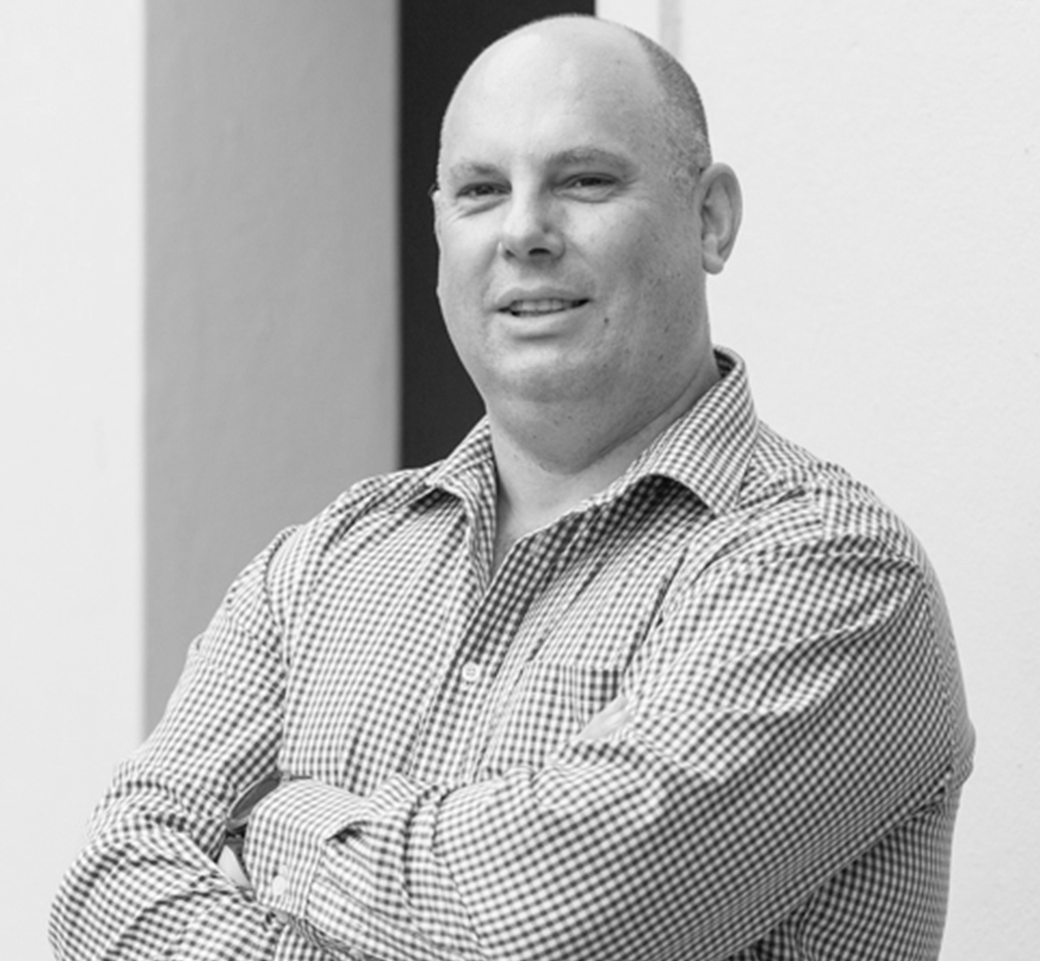The CFO’s New Mandate: Scott Farrell’s take on Emotional Intelligence, Leadership, and Judgement in a Complex World
The role of the CFO is evolving faster than ever, and it’s no longer just about numbers. In a recent episode of the CFO Club Podcast, Leana van der Merwe sat down with Professor Scott Farrell, Group CFO of B. Braun Southern Africa and professor of accounting and finance at Monarch Business School Switzerland also an upcoming speaker at the Marcus Evans 8th Annual CFO Africa Conference, to explore the expanding remit of finance leaders. Farrell brings a rare dual lens of corporate and academic experience to the conversation, offering a grounded yet forward-looking perspective on what today’s finance professionals need to thrive.From Scorekeeper to Strategist: How the CFO Role Has Changed
Traditionally seen as the guardian of financial data, the CFO is now expected to be a multi-disciplinary leader. Farrell describes the modern CFO as a risk officer, operations expert, digital transformation agent, and negotiator, a sentiment echoed in recent global research from Deloitte’s 2024 CFO Signals Survey, which noted that over 70% of CFOs now spend the majority of their time on strategy and operations, rather than financial reporting. Farrell also notes that the expectations placed on CFOs continue to expand. “Due to the complexity of business across the globe, things have definitely changed, and there’s more of a focus on the CFO role than ever before.”Why Emotional Intelligence (EQ) Is a Business Imperative
Farrell’s upcoming keynote at the 8th Annual CFO Africa Conference will focus on emotional intelligence in finance leadership, an area he believes is grossly undervalued. “Behind every set of results is a story of people, relationships, and communication,” he explains. This aligns with findings from Harvard Business Review, which highlight that leaders with high EQ outperform their peers in areas like collaboration, staff retention, and crisis management. In Farrell’s view, soft skills are not only essential for managing teams but also critical in negotiations. “Gone are the days where the CFO walks in and the room goes cold. Today, charisma and the ability to read the room are strategic assets.”Remote Work vs In-Person Collaboration: What Works in Finance
While remote work is here to stay in many sectors, Farrell expresses caution, particularly for finance teams. “Productivity tends to drop. There’s something irreplaceable about being in the same room during month-end,” he says. He emphasises the importance of non-verbal cues and team dynamics, factors that are often lost in digital communication. This is a notable contrast to companies like GitLab, which successfully operates with a 100% remote finance department. However, Farrell’s stance reflects the reality for many CFOs managing high-compliance environments or multi-functional teams where collaboration and visibility remain crucial.The Quiet Cost of Misinformation: A CFO’s Reality
In a world plagued by information overload, Farrell sees one of the CFO’s most valuable assets as common sense and judgment. Whether managing refugee-related headlines or assessing inflation impacts, Farrell argues that CFOs must filter out noise and focus on what they can control. He believes that today’s finance leaders are “the realists” in the boardroom, the stabilisers who bring clarity amidst chaos. This thinking aligns with a PwC case study on resilience during the pandemic, where the most effective CFOs were those who could quickly separate signals from noise and act pragmatically.Balancing Wellbeing and Financial Performance
Can CFOs afford to invest in employee wellbeing? Farrell says yes, but with a caveat. “Our wellness programs align with the company’s ethos and ensure people stay healthy and productive. But you can’t please everyone.” His comments echo a 2023 McKinsey report on employee mental health, which found that well-structured wellbeing programs increase productivity by 15%, provided they are embedded in the business strategy, not just offered as perks.Bridging the Skills Gap in Finance Graduates
Farrell is uniquely positioned to comment on the growing disconnect between academic training and real-world finance. One of his biggest concerns? A lack of fundamental technical skills, such as journal entries and T-accounts. He recounts interviewing qualified accountants who couldn’t complete basic debits and credits, relying instead on software automation. This is not an isolated case, a study by another South African Accounting Professional Body found that nearly 40% of junior accountants lacked basic transactional accuracy. Farrell also underscores the importance of interpersonal skills, noting that Generation Z graduates often struggle with human interaction, having grown up in a digital-first world.AI, Decision-Making, and the Future CFO
While he acknowledges the potential of AI in accelerating analysis, Farrell warns against becoming over-reliant. “AI is a tool, not the decision-maker. It can’t replace human judgment, especially in culturally diverse environments.” He’s not alone. A recent MIT Sloan case study on AI in finance found that while AI can support faster data crunching, over-dependence can introduce risk, especially if critical thinking is outsourced to algorithms. Farrell urges finance leaders to embrace technology while protecting their ability to interpret, decide, and lead. “If we surrender judgment, the world becomes more destabilised. The future CFO must be tech-savvy, but grounded in common sense and emotional intelligence.”Leadership from the Inside Out
Scott Farrell leaves us with a powerful message: true leadership starts with self-leadership. “It’s not about how well you manage your team, it’s how well you manage yourself.” As the CFO role continues to evolve, one thing is clear: the most successful finance leaders of the future will be those who combine financial acumen with empathy, critical thinking, and resilience. Want more insights like this? Explore the CFO Club Blog and listen to the full podcast episode featuring Scott Farrell.Transcript
Guest: Professor Scott Farrell, Group CFO at B. Braun Southern Africa and professor at Monarch Business School Switzerland
Host: Leana van der Merwe, Technical Specialist at CIBA and Content Developer at CFO Club
Leana van der Merwe:
Good day, listeners, and thank you so much for joining us today for our CIBA podcast. Welcome to the CFO Club Podcast. Today, we’re going to explore the world of finance leaders beyond the balance sheet. We know there’s so much more to being in the finance space than just the numbers, and today we have a remarkable guest—Professor Scott Farrell, the Group CFO of B. Braun Company Southern Africa and a professor of accounting and finance at Monarch Business School Switzerland.
With over twenty years of experience in financial and general management—including his time in Ireland and his current role in South Africa—Professor Farrell has seen the evolving role of finance professionals firsthand. Beyond the numbers, he’s a passionate advocate for the power of soft skills and leadership. He’ll also be speaking at the 8th Annual CFO Africa Conference on how emotional intelligence can drive leadership excellence. We always say there’s so much more to the CFO role today than what it used to be—simply focusing on the numbers. Scott, thank you so much for joining us today.
I’m going to dive in with our first point of discussion, and then you can greet our listeners and say a little bit about yourself. You’ve led finance teams across multiple countries and very different industries. In your experience, how has the role of a CFO evolved over the last couple of years? Are today’s CFOs still expected to be just the guardians of financial data, or has the role become more than that?
Scott Farrell:
Thank you, Leana. A warm welcome to all your listeners and viewers. It’s a pleasure to be here, and thank you for the invite.
That’s a good question to start with, because traditionally, when I wanted to become an accountant, it was simply because I thought I wouldn’t have to deal with people!
I think the CFO role has evolved tremendously. It’s no longer just about crunching numbers or guarding financial data—it’s expanded significantly over the past years. In today’s world, the CFO is expected to be a risk officer and an operations expert, especially in areas like supply chain and negotiations. They’re also seen as digital transformation agents, strategists, negotiators, legal advisers when necessary, and overall business advisers. It has really changed—and continues to change.
I think the landscape is somewhat unknown in terms of where the CFO role is ultimately heading. But overall, due to the increasing complexity of global business, the expectations on the CFO have grown significantly.
Leana van der Merwe:
Thanks so much, Scott. I must say, at CIBA we’re very proud of our Chartered CFO designation, which is approved by SAQA. We’ve done a lot of research to support this designation, and we’re finding the same thing—you really do need more than just technical skills these days.
I like that you mentioned the CFO as a risk officer because in many of the podcasts we’ve done, CFOs have brought up risk as a major area of focus. I often say, when things go pear-shaped, the first person everyone looks to is the poor CFO in the boardroom—asking, “Why didn’t you see that coming?” The CFO really is the eyes and ears of the business.
Scott, your upcoming talk at the CFO Africa Conference focuses on the power of soft skills and emotional intelligence. Some might say that in finance, results matter more than relationships. Do you think emotional intelligence is overvalued in leadership, or are we still not giving it the attention it deserves?
Scott Farrell:
I think it’s completely undervalued at the moment. If you look at a set of results—they’re just that: results. But behind those numbers are the outcomes of relationships and interactions with people—whether that’s customers or internal colleagues.
Of course, results matter, but we need to understand what drives them. It’s about how well an organisation functions and communicates internally. Especially in finance, where things can be very black and white, soft skills play a huge role. If you’re leading a finance, sales, or operations team, coordination and communication are critical.
Soft skills and emotional intelligence even bring value to the negotiation table. Gone are the days when the CFO walked in and the room went cold. Today’s CFO needs to have a charismatic personality and be able to get the best out of people—even in negotiations.
Leana van der Merwe:
Listening to you talk about teams, motivation, and managing people across borders really got me thinking. I recently read about an organisation advertising remote positions across three continents. They require language fluency but everything is virtual. I couldn’t help but wonder—how do you keep people connected and motivated in that kind of setup?
So if we talk about soft skills and team management, do you have any secret success stories or tips for keeping teams motivated and aligned to a common goal?
Scott Farrell:
What comes to mind is when I was first promoted to CFO at the age of 35. What I learned quickly is that it’s not about how well you manage others—it’s about how well you manage yourself.
I’m a big proponent of self-improvement and working on your own skills. So my answer would be: start with yourself. Leadership starts from within. EQ skills are something you must develop. You have to learn to read people and understand that different people react differently to the same information. It’s fascinating to see how cultural differences influence decision-making, even when people have access to the same data.
Remote work makes this harder, and while I know it’s the way the world is moving, I still advocate for in-person presence—at least some of the time. We’re not machines; we’re human beings. Communication is far more effective when it’s face-to-face.
Ultimately, teamwork depends on the leader. And being promoted into leadership doesn’t mean you’ve arrived—it means you’ve earned experience, but you still have to keep growing.
Leana van der Merwe:
Absolutely, Scott. And congratulations again on stepping into the CFO role at such a young age! I love that you say it starts with managing yourself. Understanding people, reading their responses, and adapting your approach can make all the difference.
An older colleague of mine used to say, “People are instruments—you just need to know what makes them play for you.” That always stuck with me. Everyone is motivated differently, and it’s so important to get to know your team.
Now, I was listening to the radio earlier, and they were talking about people leaving South Africa under refugee status. It got me thinking about global instability—economic pressures, inflation, sanctions, and disrupted supply chains.
As the CFO of a multinational in the pharmaceutical sector, how do you balance immediate financial priorities with long-term sustainability, especially when many of these issues are external?
Scott Farrell:
The first word that comes to mind is “common sense.” A friend of mine often says, “Common sense isn’t that common anymore,” and it’s true.
We’re living in a time where misinformation and disinformation are rampant. Take the example of the 49 South Africans who left for the US as refugees. From the US’s viewpoint, that paints a very different picture of what’s happening here—likely an inaccurate one.
From a CFO’s perspective, we deal with an overwhelming amount of data. You have to learn what to focus on and what to filter out. A big part of the role is being the realist in the boardroom—the person who brings stability and practical thinking.
AI and digital tools are great, but we have to constantly question: is this data accurate, reliable, and relevant? That’s where judgment becomes critical.
In our business, which is still family-owned and has been for more than 180 years, we focus on pragmatic, sustainable growth. We don’t rush; we grow at a pace that’s manageable. That consistency has helped us weather many storms.
Leana van der Merwe:
That brought a smile to my face, Scott. People often think “family-owned” means small mom-and-pop shops, but B. Braun is a fantastic example of a large, successful, family-owned company. We’re working on a project around family businesses for our CIBA members, and I’d love to pick your brain on that in future.
Let’s talk about employees. From a CFO’s perspective, is it always worth investing in employee wellbeing? It often comes at a cost. How do you strike the balance between wellbeing and cost control, especially when wellbeing initiatives can be misunderstood or abused?
Scott Farrell:
It’s not easy, and I think wellbeing means different things to different people.
We have wellness programs, but we make sure they align with the company’s goals and ethos. You also learn over time that you can’t please everyone. Sometimes employee wellbeing is misunderstood—people expect more than what’s realistically intended.
Our programs are designed to support mental health and give employees access to external resources. But again, these programs are there to ensure people stay healthy and productive. That’s the bottom line.
Leana van der Merwe:
Exactly. The world we live in is so different. Fifty years ago, you left the office at five and nobody could reach you. Today, your phone pings in bed—it’s your supplier, a team member, a customer. There’s constant availability.
That’s why I agree that taking care of your staff pays off. Healthy, supported employees are productive employees.
Now let’s go back to remote work. You’ve hinted at your views, but let’s dive in—are people losing accountability and discipline? What works and what doesn’t?
Scott Farrell:
In my experience—especially in finance—remote work just doesn’t perform as well.
It’s not about autonomy; it’s about productivity. Having everyone in the office simply works better. Finance is a discipline. It’s predictable. Month-end comes around like clockwork, every 30 days. We need the ability to collaborate in real time.
During month-end, I have all department heads in the boardroom. Technically, it could be done via Teams, but in-person, you pick up on so much more—body language, energy, unspoken concerns. You feel the atmosphere and see pressure points that might otherwise go unnoticed.
It’s not just a South African issue either. Even in other countries, I’ve seen remote work negatively affect finance productivity. For now, I strongly believe in having people physically present.
Leana van der Merwe:
I completely agree. You can tell so much just by looking at someone in the room—who’s struggling, who’s excelling. Those nuances get lost online.
Now, Scott, you bring a unique blend of CFO and academic experience. Many people say that graduates today are heavy on theory but lacking in practical application. Do you agree? Where is the biggest gap, and how can we address it?
Scott Farrell:
Absolutely, there is a gap. We can look at it in two parts: the accounting role and the CFO role.
Even on basics—like journal entries—I’ve interviewed qualified chartered accountants who can’t properly answer simple questions. One candidate couldn’t tell me how to dispose of a desk. His answer? “The system does it for you.” But how do you know the system is set up correctly?
AI plays a role here. The more we automate, the fewer opportunities there are to build foundational understanding. And that’s dangerous.
There’s also a gap in interpersonal and EQ skills. I’m not saying we all need to become psychologist-accountants, but communication and interaction are essential in today’s finance world.
CFOs, in particular, need a “tough mentality.” You have to make hard decisions—some people will agree, some won’t. That resilience is vital.
Even in our internal courses, qualified people thank me for clarifying the basics. That says a lot.
Leana van der Merwe:
I can’t imagine doing accounting without T-accounts! I still use pen and paper myself.
Scott Farrell:
Same here—T-accounts are fundamental. You can tell a lot about a candidate just by seeing if they reach for a calculator or try to sketch the flow.
Leana van der Merwe:
Let’s wrap up by talking about the future of finance leadership. Technology and AI are evolving fast. What’s the most critical skill for future CFOs to develop?
Scott Farrell:
Judgment.
That’s the most important skill, especially as AI becomes more prevalent. AI is a tool—not the endgame. It can help with speed and maybe accuracy, but it can’t replace human judgment.
This is especially true in cross-cultural environments. I work across the Middle East and Africa, and even with the same data, the decisions vary based on cultural context.
AI doesn’t know that.
Future CFOs need to be digitally savvy—but also know where to draw the line. AI can assist, but it shouldn’t make the decisions. If we surrender that skill, we risk chaos.
Leana van der Merwe:
Thank you so much, Scott. We’ve taken away some fantastic insights today. We look forward to seeing you at the CFO Africa Conference and hope to have you back on the podcast soon.
Scott Farrell:
Likewise, Leana. Thank you again for the invite, much appreciated.
Leana van der Merwe:
Thanks, listeners, for tuning in. We’ll see you again next week!
Related Posts
5: Lorien Gamaroff
CEO: Centbee Reinvention of the sound money concept. South Africa’s foremost blockchain expert, Lorien Gamaroff, provides insight to blockchain technologies and their benefits. CIARAN RYAN: This is CFO Talks and today we are really excited to be joined by Lorien Gamaroff, CEO of Centbee, a cryptocurrency payment company. He’s also the chief ex
8: Bryan Dorfan
CEO & CFO: Alyak Investments From CFO to business owner: Drawing on his financial and forensic experience, Bryan Dorfan’s new consultancy assists businesses to improve their profitability. CIARAN RYAN: This is CFO Talks and today we are talking with Bryan Dorfan, who’s chief executive officer and chief financial officer of Alyak Investment
4: Talifhani Khubana
CFO: Pan South African Language Board The Pan South African Language Board was established by an Act of Parliament in 1995, it falls under the Department of Arts and Culture and its purpose is to promote multilingualism in South Africa, where we have eleven official languages. CIARAN RYAN: This is CFO Talks and […]
12: Pieter de Wit
Chief Financial Officer: Afrimat Don’t waste a good crisis. ‘We are a very entrepreneurial-type culture in Afrimat and we always look for opportunities in the crisis.’ CIARAN RYAN: This is CFO Talks and today we’re joined by Pieter de Wit, chief financial officer at Afrimat, a construction materials and mining company listed on […]

